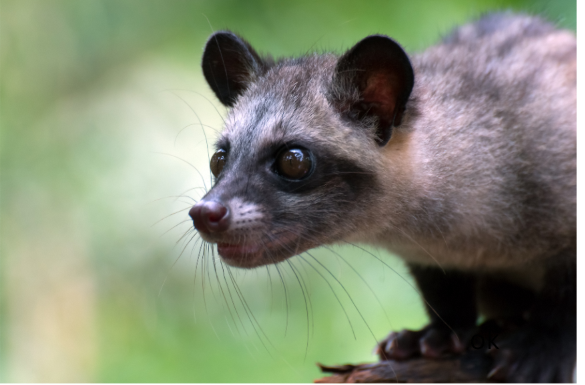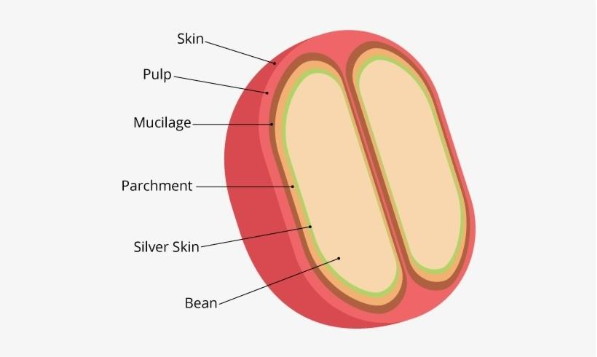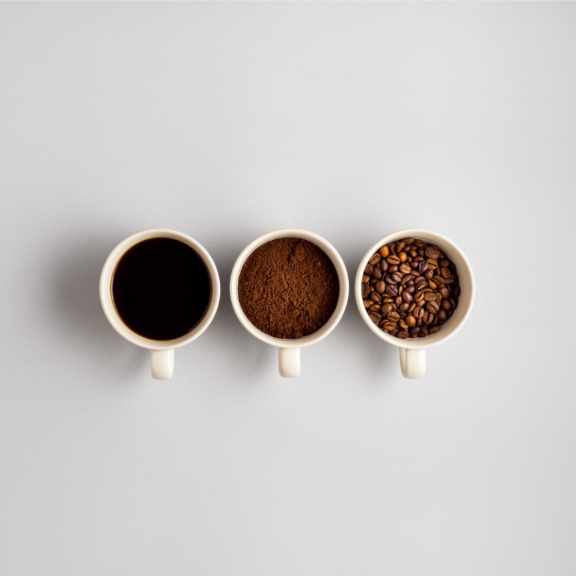Is kopi luwak halal or haram? A brewing controversy
|
Sections: What is kopi luwak? | Understanding coffee bean structure | The kopi luwak production process | Halal status of kopi luwak | Animal welfare consideration |
What is kopi luwak?
Kopi luwak originates from Indonesia, where "kopi" means coffee and "luwak" refers to the Asian palm civet (a small, nocturnal mammal native to Africa and Asia, also known as ‘musang’).
Kopi luwak is made using coffee cherries that have been eaten and digested by the civets. These mammals are naturally selective feeders who instinctively choose only the ripest, highest-quality coffee cherries. The civets' keen sense of smell allows them to identify the best cherries, effectively performing the first quality control step that would otherwise require skilled human labour.
Kopi luwak is popular due its health benefits and low caffeine nature. The enzymatic action during digestion in the civet’s stomach appears to lower the coffee's acidity levels, making it ideal for individuals with sensitive stomachs. This reduction in acidity is attributed to the breakdown of certain proteins and acids during the beans' passage through the civet's digestive system.
Understanding coffee bean structure
To understand why kopi luwak may be considered halal, we must first understand the structure of a coffee bean. A coffee "bean" is actually a seed that sits inside a coffee cherry (the fruit of the coffee plant). The structure consists of several protective layers:
From outside to inside:
1. Outer Skin (Exocarp) - The outermost red or yellow skin of the coffee cherry
2. Pulp (Mesocarp) - The sweet, fleshy layer beneath the skin
3. Mucilage - A sticky, honey-like layer that surrounds the bean
4. Parchment (Endocarp) - A papery, protective hull that directly covers the bean
5. Silver Skin (Perisperm) - A thin, silvery membrane that clings to the bean
6. Coffee Bean (Seed) - The actual seed inside, which is what eventually being roasted
This multi-layered structure is crucial to understanding the halal argument. When civets consume coffee cherries, they swallow them whole. The digestive process removes the outer fruit layers (skin, pulp, and mucilage), but the parchment layer and the bean itself remain largely intact and protected throughout the animal's digestive system. If the beans come out broken, they will be disposed and rejected.
The kopi luwak production process
1. Civets are being fed with ripe coffee cherries
2. The civet’s digestive enzymes will partially digest the coffee cherries for about 12 – 36 hours
3. Excreted coffee beans are collected and manually filtered to ensure beans are still intact. Broken beans will be disposed.
4. The selected beans are thoroughly washed and dried (either by sun-drying or mechanically)
5. Dried coffee beans are then roasted at high temperature, typically between 180 – 220 Degrees Celsius
Halal status of kopi luwak
According to Imam Al-Nawawi, "If the animal consumed the beans, and when the beans are excreted out, they keep their shape (not ingested), and if they are planted, they can still grow, then it is pure."
After reviewing the opinions of scholars regarding food that is covered by najis (impurity), we can conclude that most of them are of the opinion that the seed is still pure if the plant seed is still in its original form and can grow when planted.
This is in accordance with the following Islamic legal maxims:
وفى الأصل في الأشياء النافعة الاباحة، الأشياء الضارة الحرمة
“The original ruling of beneficial things is permissible, while for harmful things it is prohibited.”
الأصل فى الأشياء الإباحة، ما لم يقم دليل معتبر على الحرمة
“The original ruling of something is permissible until a clear and strong evidence prohibits it.”
الأصل بقاء ما كان على ما كان
“The original ruling of something is its original ruling (of permissibility).”
According to the above fiqh, luwak coffee is ruled permissible for the beans are originally clean and processed through the digestive system of the civet, excreted out still retaining its original shape and state without any damage on the structure of the coffee beans.
This principle directly applies to kopi luwak production for several key reasons:
-
Structural integrity: The coffee beans remain intact after excretion and maintain their original shape without any alteration to their structure throughout the digestive process.
-
Viability: The excreted coffee beans can still be planted to grow new coffee plants, proving that the seeds remain in their original, unaltered form.
-
Natural protection: The beans themselves never come into direct contact with impurities, as they are shielded by their natural outer covering throughout the digestive process. This is similar to how eggs are protected by their shells despite coming from chickens.
-
Thorough processing: The coffee beans are deshelled, washed, and dried before final processing, removing any impurities that may have appeared on the outer shell.
Based on the points above, kopi luwak is considered permissible to consume as long as it fulfils all the requirements stated above.
Whilst all halal certifying bodies follow Islamic principles, their specific standards and examination processes for unique products like kopi luwak may differ considerably. Muslim consumers may contact the manufacturer directly and inquire on their production methods. Reputable producers often provide detailed information about their collection and processing methods. Look for transparency about how beans are gathered, whether they are sourced from wild civets or farm-raised animals, and what cleaning processes are used. As Muslims, we are encouraged to be responsible consumers.
The Prophet s.a.w. said:
أَلاَ كُلُّكُمْ رَاعٍ وَكُلُّكُمْ مَسْئُولٌ عَنْ رَعِيَّتِهِ
“Each of you is a shepherd and each of you is responsible for his flock.”
(Sunan Abi Dawud)
And in another hadith, he s.a.w. said:
دَعْ مَا يَرِيبُكَ إِلَى مَا لاَ يَرِيبُكَ
“Leave that which makes you doubt for that which does not make you doubt”
(Sunan An-Nasa'i)
Animal welfare consideration
Although kopi luwak is deemed as halal, it is important to note that modern commercial kopi luwak production often involves keeping civets in captivity under poor conditions, which raises additional ethical concerns from an Islamic perspective.
Read: Halalan toyyiban: More than just halal
Islam emphasises the humane treatment of animals and supporting industries that cause animal suffering are discouraged. While it is permissible to be consumed, it is highly recommended to source coffee beans from companies that prioritise the well-being of the civets and do not exploit these animals for commercial gain.
References
-
10 Nov 2016, Mufti of Federal Territory’s Office. Irsyad Al-Fatwa Series 142: The ruling of drinking Luwak Coffee (Civet Coffee) Pejabat Mufti Wilayah Persekutuan - IRSYAD AL-FATWA SERIES 142 : THE RULING OF DRINKING LUWAK COFFEE (CIVET COFFEE)
-
Majmu’ Sharh Muhazzab (Kitabul Haidh, Bab Izalatul Najasah) (3;557)
Articles on Muslim.Sg may be reproduced electronically or in print with prior permission from Muslim.Sg. Proper credit must be given to the author(s) and Muslim.Sg.




